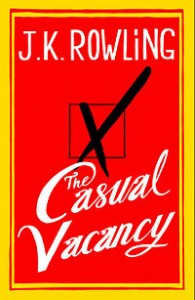Harry Potter, it’s not. But that’s OK, says Steve Wishnevsky, who has just read J.K. Rowling’s first novel for adults.
By Stephen Wishnevsky
THE CASUAL VACANCY. By J.K. Rowling. Little, Brown 512 pages. $35.
 This is an odd, very understated slice-of-life novel, touted as Rowling’s first adult novel. About half of the main characters are teenagers, but they are not as uncomplicated as Harry Potter and friends. They have lots of problems, both real and imagined, self-inflicted and imposed by their parents. A couple of good solid cases of abuse, some drug and alcohol addiction – most parents, at least the males, are suffering from delusions of various sorts.
This is an odd, very understated slice-of-life novel, touted as Rowling’s first adult novel. About half of the main characters are teenagers, but they are not as uncomplicated as Harry Potter and friends. They have lots of problems, both real and imagined, self-inflicted and imposed by their parents. A couple of good solid cases of abuse, some drug and alcohol addiction – most parents, at least the males, are suffering from delusions of various sorts.
Not a happy little town, Pagford, even though its image tends to the idyllic. Barry Fairbrother, popular member of the Town Council, dies unexpectedly, leaving the town in shock. There must be an election, and as the several adults strive to fill the vacancy, they inevitably add more stress to the lives of their spouses and children.
Eventually one of the teenage children makes a move, foolish and vindictive as it might be, and the adults overreact in typical ways. The main characters are two sets of friends, two boys and two girls, and a solitary girl from the Council Homes, the slum. Assorted people enjoy or suffer from assorted vices and thrash about in reaction to mostly imaginary enemies. Eventually a tragedy ensues.
In true Rowling fashion, the real story is class warfare, the lines clearly delineated in personality and action. The Sikh family of doctors plays a prominent part in the conflict, even though their instinct is to avoid any confrontation. Nobody seems to embark on any quests, nobility of spirit is prominently absent, and even “muddling through” has its limits. All that said, I very much enjoyed this novel. The meek inherit a few benefits, if not the earth, and life goes on.
Recommended, if you are willing to take it as it was written, and don’t try to make it fit your idea of what Rowling should have written. She can probably write anything she chooses, and she chose to write this book. Stet.